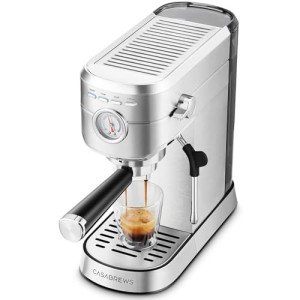Home Use Espresso Machines: A Comprehensive Guide
Espresso machines have actually become a staple in lots of households as coffee lovers look for to replicate café-quality brews in the comfort of their cooking areas. The rise in appeal has resulted in a varied market filled with different models, features, and rates. This article intends to offer a useful introduction of home use espresso machines, assisting readers browse their alternatives effectively.
Understanding Espresso Machines
Espresso machines work by forcing hot water through finely-ground coffee under high pressure, resulting in a concentrated coffee drink called espresso. There are numerous kinds of espresso machines categorized based on their developing methods and level of automation. The most common types include:
- Manual Espresso Machines: These require the user to control the pressure and water circulation, enabling for a more hands-on coffee-making experience.
- Semi-Automatic Espresso Machines: These use automatic control over water pressure, while the user manually grinds and tamps the coffee.
- Automatic Espresso Machines: With the push of a button, these machines automatically manage the flow of water, making it much easier to brew espresso with constant outcomes.
- Super-Automatic Espresso Machines: These all-in-one machines manage grinding, tampering, developing, and even milk frothing, making them perfect for users trying to find benefit.
- Capsule or Pod Machines: These use pre-packaged coffee pods to produce espresso with very little effort, but they restrict option in developing methods and tastes.
Table: Comparison of Espresso Machine Types
| Type | Control Level | Reduce of Use | Cleaning Level | Suitable For |
|---|---|---|---|---|
| Manual | User-controlled | Moderate | High | Coffee perfectionists |
| Semi-Automatic | Partial automation | Moderate | Moderate | Home baristas |
| Automatic | Totally automated | Easy | Low | Hectic people |
| Super-Automatic | Completely automated | Very simple | Really low | Convenience hunters |
| Capsule/Pod | Completely automated | Really easy | Really low | Casual drinkers |
Secret Features to Consider
When selecting a home use espresso machine, it's necessary to think about numerous features that can substantially affect the quality of espresso and user experience.
- Pressure: Look for machines that supply a minimum of 9 bars of pressure, as this is thought about ideal for brewing espresso.
- Boiler Systems: Single vs. dual boiler systems identify temperature level stability and the capability to brew espresso and steam milk all at once.
- Grinder: Integrated mills enable for freshly ground coffee, which improves taste. Think about machines with adjustable grind settings.
- Milk Frother: For those who enjoy coffees and lattes, an integrated steam wand or automatic frother is essential.
- Size and Design: Consider your kitchen area area and visual choices. Machines can be found in numerous sizes, from compact to big setups.
- Cost: Home espresso machines can vary from a couple of hundred to several thousand dollars, so it's important to establish a budget before checking out options.
Benefits and drawbacks of Home Use Espresso Machines
| Pros | Cons |
|---|---|
| Benefit of developing coffee at home | Preliminary financial investment can be high |
| Quality of espresso is often superior | Requires some skill, particularly with manual machines |
| Capability to explore tastes | Maintenance and cleansing can be labor-intensive |
| Can conserve money in the long run | Not all machines will match every coffee preference |
Maintenance and Cleaning Tips
Maintaining an espresso machine is essential for lengthening its life and ensuring consistent brew quality. Here are some helpful tips:
- Regular Descaling: Minerals from water can build up in the machine. Descale every 1-3 months, depending upon water firmness.
- Daily Cleaning: Rinse portafilters, baskets, and steam wands after each use to prevent coffee oils from developing residue.
- Use Filtered Water: This can assist decrease mineral buildup and enhance the taste of coffee.
- Replace Gaskets and Seals: These components might wear over time and must be changed to preserve pressure and efficiency.
- Read the Manual: Each machine has specific care directions; following these will guarantee longevity.
Frequently Asked Questions About Home Use Espresso Machines
Q1: What is the very best budget espresso machine?The best budget espresso machine typically depends upon private needs, however models like the DeLonghi EC155 or the Breville Bambino are popular among users for supplying great worth. Q2: How long do home espresso machines generally last?With proper upkeep, home espresso machines can last anywhere from 5 to 15 years, depending on the quality of the machine and frequency of use. Q3: Can I make cappuccinos and lattes with any espresso machine?While most espresso machines can make coffees and lattes, having a reputable
steam wand or frother is essential for attaining the right milk texture.
Q4: Are super-automatic machines worth the investment?For you can check here who prioritize convenience and quick developing, super-automatic machines can be worth the investment, though they might do not have some customizability in brew strength and flavor. Q5: What types of coffee beans are best for espresso?While individual choice contributes, beans labeled as" espresso "blends are normally roasted darker, creating abundant flavors and a creamy texture when brewed.
Buying a home espresso machine can transform the daily coffee routine into something unique, raising home brews to café quality. By comprehending the various types of machines, crucial functions to consider, maintenance needs, and weighing the
advantages and disadvantages, customers can make informed decisions that fit their private preferences. As the espresso culture continues to grow, no matter the choice, every brew can be a scrumptious experience waiting to be appreciated.

